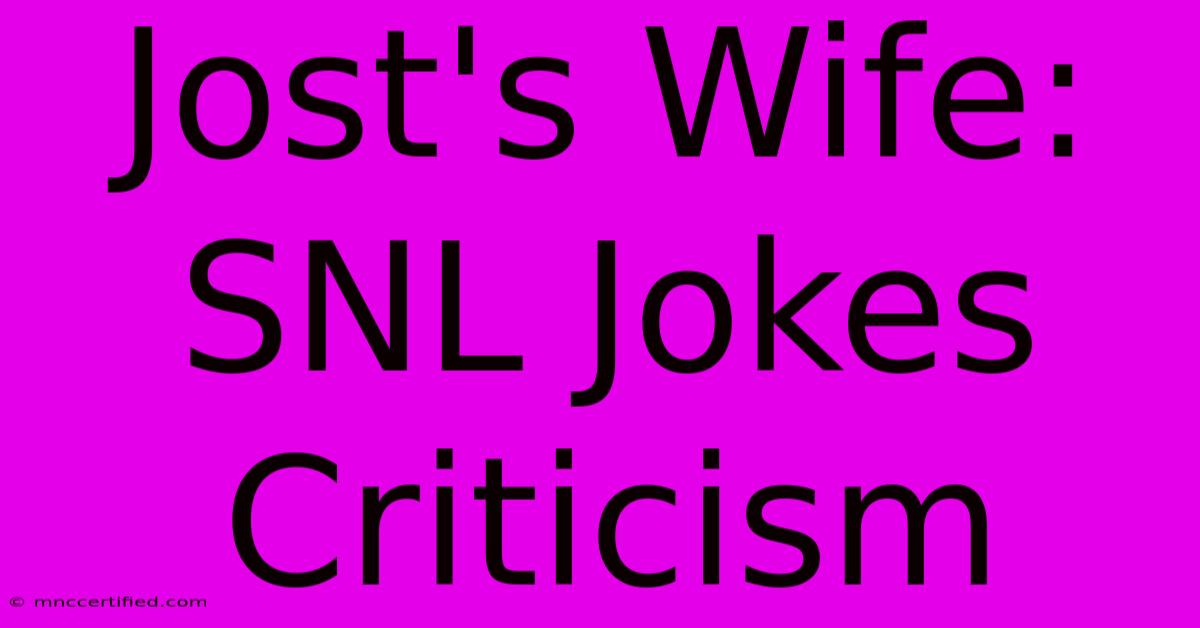Jost's Wife: SNL Jokes Criticism

Table of Contents
Jost's Wife: SNL Jokes & the Backlash – A Deep Dive into the Controversy
Colin Jost, the Weekend Update co-anchor on Saturday Night Live (SNL), has often found himself at the center of controversy, particularly when his jokes target his wife, Scarlett Johansson. This article delves into the criticism surrounding these jokes, exploring the nuances of humor, public perception, and the complex relationship between celebrity, comedy, and the audience.
The Nature of the Jokes: Self-Deprecating or Inappropriate?
Jost's jokes about Johansson on SNL have ranged from playful jabs at their relationship dynamics to more pointed observations about their differing personalities and lifestyles. While some viewers find this self-deprecating humor endearing and relatable, others perceive it as inappropriate, disrespectful, or even misogynistic. The key difference often lies in the intent and the execution of the jokes.
A crucial element here is the context. Is the joke a lighthearted observation within a broader comedic sketch, or does it dominate the narrative, potentially overshadowing other material? The delivery also plays a critical role. A joke delivered with genuine affection and a twinkle in the eye can be perceived differently than a joke delivered with a tone of condescension or mockery. The subtle nuances of performance can greatly impact audience reaction.
Examining Specific Examples
Analyzing specific examples of Jost's jokes about Johansson is crucial to understanding the criticism. For instance, jokes that rely on stereotypes about women or their roles in relationships are likely to receive more negative feedback than jokes that poke fun at the couple's quirky differences in a balanced and respectful manner. The line between playful banter and harmful stereotyping is often thin and easily crossed.
The Public's Reaction: A Spectrum of Opinions
The public reaction to Jost's jokes about his wife is far from monolithic. Some find his humor charming and appreciate the apparent comfort level between the couple. Others, however, criticize him for potentially exploiting his wife's celebrity status for comedic effect, arguing that it's inappropriate to make light of her personality or personal life without her explicit consent. The differing viewpoints highlight the subjective nature of humor and the varying interpretations of comedic intent.
Social media has amplified these discussions, creating a platform for both praise and condemnation. The speed and scale at which opinions are shared online can intensify the controversy, adding another layer of complexity to the issue.
The Role of Social Media in Amplifying Criticism
The rapid spread of opinions on platforms like Twitter and Instagram can swiftly escalate minor criticisms into full-blown controversies. The lack of nuance often present in online discussions can contribute to misinterpretations and the polarization of viewpoints. This makes it crucial to critically evaluate online commentary and consider the potential biases of various sources.
The Broader Context: Celebrity, Comedy, and Consent
This controversy is intrinsically linked to the larger discussion around consent in comedy, particularly when the subject of the joke is a celebrity partner. Does a public figure automatically forfeit control over their image and personal life when they enter the public sphere? While humor often thrives on pushing boundaries, finding the appropriate balance between comedic license and respectful boundaries is paramount.
Moreover, the debate touches on the power dynamics inherent in celebrity relationships. The potential for exploitation or unequal representation needs to be carefully considered. Jokes that rely on imbalances of power or perpetuate harmful stereotypes can be particularly damaging.
Conclusion: Navigating the Complexities of Humor and Public Perception
The criticism surrounding Colin Jost's jokes about Scarlett Johansson highlights the complexities of humor in the age of social media. While comedy relies on pushing boundaries and challenging societal norms, navigating this space requires sensitivity, self-awareness, and a commitment to responsible humor. Ultimately, the success or failure of such jokes hinges on a nuanced understanding of context, intent, and the potential impact on the individual and the broader audience. The conversation continues, prompting us to reflect on what constitutes appropriate humor, the power of public perception, and the responsibilities of celebrities and comedians alike.

Thank you for visiting our website wich cover about Jost's Wife: SNL Jokes Criticism. We hope the information provided has been useful to you. Feel free to contact us if you have any questions or need further assistance. See you next time and dont miss to bookmark.
Featured Posts
-
Johanssons Reaction To Josts Explicit Joke
Dec 23, 2024
-
Us Navy Pilots Downed Over Red Sea
Dec 23, 2024
-
Premier League Man Utd Loss Everton Chelsea Draw
Dec 23, 2024
-
Flintoff Opens Up Post Crash
Dec 23, 2024
-
Southampton Fulham Draw Jurics Stand
Dec 23, 2024